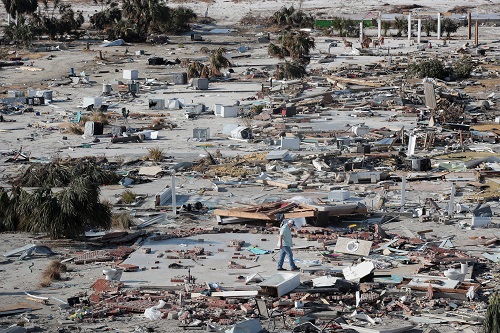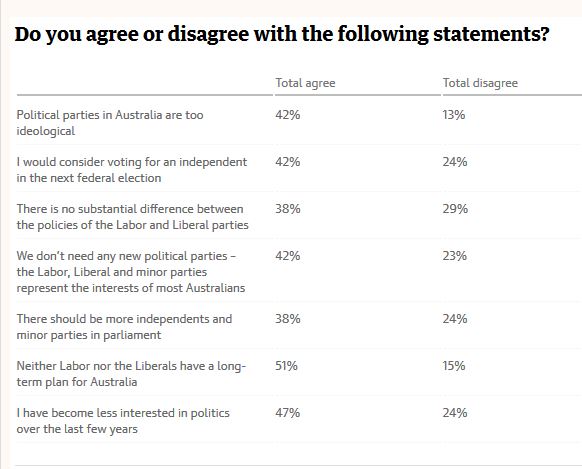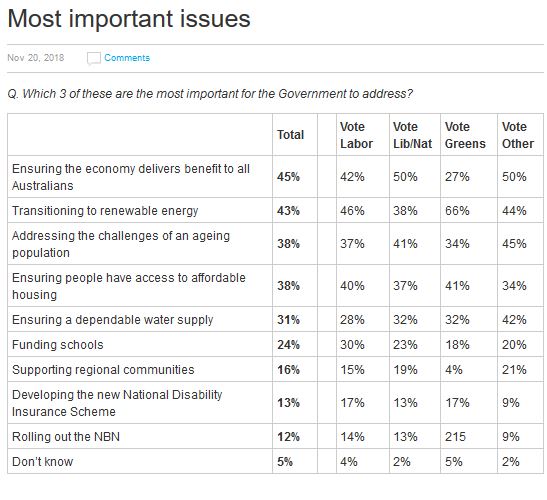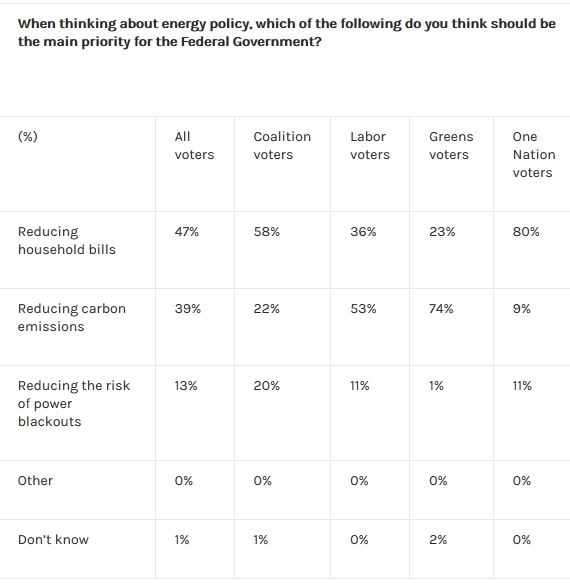
Essential Report and Fairfax-Ipsos have both tightened to a Labor lead of 52-48 as Labor plans to launch its climate change policies on Thursday.
Which makes the PM for fair dinkumness perhaps surprisingly competitive.
Peter Lewis suggests that Voters are looking for more than the major parties offer at the moment. He quotes polling that shows at least 20% of votes are still up for grabs. However, if you consider this table, then there is considerable disaffection for the major parties, and a good independent would be in with a show:

Labor has been largely standing back allowing the Liberals to make themselves look ridiculous. Unfortunately the LNP/Liberals have been devaluing the whole currency of politics for a very long time. David Marr told Richard Fidler this began in earnest when Kevin Rudd squibbed climate change in 2010.
I think it goes back to the ‘Tampa’ election of 2001 when John Howard made clear he would do whatever it takes to gain and hold onto power. Since then we have had slogans and scare campaigns rather than policy. We’ve had interludes with Kevin 07, and Gillard working with the Greens on climate, but that added to public distrust when Rudd abandoned the CPRS and Gillard so blatantly broke her promise about no carbon tax while she was PM.
Now at least climate change is coming to the fore again as an issue. This table from Essential puts renewable energy up there as the most important issue after the motherhood one about the economy:

This poll from Fairfax-Ipsos puts reducing emissions well ahead of household bills with Labor and Green voters:

However, the formulation of questions is problematic, as it assumes a binary where people have to choose between higher household bills and reducing emissions. Labor is going to contend that their policy will do both.
I understand that Labor will stick with its long-term policy of 45% reduction of emissions by 2030, so as not to frighten the horses. Also reports are that they will adopt a form of the NEG (National Energy Guarantee), which after all has been accepted three times by the Liberal party room and represents the best chance of longer term bipartisanship.
Word is that if they win the next election the best that can be hoped for is that Labor plus Greens will needs a couple of crossbenchers to pass anything in the senate, which makes adventurous policy difficult.
Meanwhile the world is waking up in fright. This from a single Google feed today:
-
Will We Survive Climate Change? Possibly. There is ‘no scientific support for inevitable doom,’ one expert notes.
Climate change is going to make life on Earth a whole lot worse, report predicts
- “The evidence was absolutely mind-blowing to me,” said the lead researcher.
Climate change to trigger widespread hazards to Earth and humanity – many at the same time
- Don’t say we weren’t warned.
From human health to the world’s food supply, from water scarcity to widespread migration and violence, the threats from climate change are much larger than previously thought, a study released Monday suggests.
And in many places, several threats will be happening at once.
‘Like a Terror Movie’: How Climate Change Will Cause More Simultaneous Disasters
Climate change no longer a far-off, subtle threat, says climate expert
Given the prevalence of climate contrarianism across the Coalition, and the outright denialism of the so-called right rump that seems to hold Liberal leaders hostage, we have to be thankful that climate change is will be one of the leading issues. We can just hope that the voters will play their part.

Posted Sunday (Nov 18) on the SMH is an article by Nicole Hasham headlined Labor poised to sign off on long-awaited energy plan. The article begins with:
Meanwhile, posted today in the SMH is an article by Peter Hannam headlined ‘Scandal’: NSW coal power plants will kill thousands before they close. It begins with:
The Environmental Justice Australia report The health burden of fine particle pollution from electricity generation in NSW, by Dr Ben Ewald B.Med, PhD, I believe was published today.
In the meantime,
Qld state branch fails to endorse his nomination despite 100% support from his branch. Given that Littleproud is one of the National’s leading performers it seems the current LNP’s capacity to self destruct is still alive and healthy.
ABC Justin goes on to say:
Rebate of $2000 on home batteries, for a household with income below $180,000.
Good work, Electricity Bill.
Sounds good from what I’ve heard this morning. 50% reductions in electricity and 45% economy-wide.
Labor are talking about setting up contracts for new energy through a body like the Clean Energy Finance Corporation. including longer term power purchase contracts.
Taylor is just saying labor will put a wrecking ball through the economy, and he says renewables plus batteries don’t equal baseload. No-one said they did.
Heard a voice, sounded like R di Natale, saying Labor has run up the white flag on climate change because there was no price on carbon. If that is what he said I find it beyond annoying.
Brian:
The Greens obsession with putting a price on carbon damaged both Rudd and Gillard. The Greens too often just look stupid when they start insisting on a particular “how” (Ex: Carbon price) instead of the “what” (Ex: Reduce greenhouse emissions.”
In some cases it makes sense to put up the “It might be done this way” when the government start saying silly things like “fossil power is the only way to provide baseload”.
The crux is to say:
“It might be done this way”, instead of insisting that
“It must be done this way”
Emission reductions have to meet up with practicality, as JohnD, BilB, Brian and others have clearly been insisting….
Professor Will Steffen provided an Expert Report to the Independent Planning Commission NSW (IPCN) for the final Determination of the proposed Bylong Coal Project. The Executive Summary included (bold text my emphasis):
I think Labor’s energy policy is not sufficiently ambitious, given Professor Will Steffen’s expert statements, and other leading climate scientist opinions. I heard on the radio late this afternoon that Labor is still intending to support gas as a transition fuel – in my opinion, that is a bad move – we need to leave gas before gas leaves us!
GM:
I think it is more important to drive the bulk of our power renewable as soon as possible. However, I have no problem with the use of gas to provide some back-up during this transition if this makes economic and rapid transition sense.
Geoff M, of course Labor’s policy lacks ambition, but it is a start, is scalable, and is probably all that is politically possible at present.
Will Steffen is improving and is right to stress that ” risks rise rapidly and nonlinearly with the rise in global average surface temperature.”
However, he is wrong in thinking there is a budget of burnable carbon. Hansen told us in 2007 that atmospheric CO2 concentrations needed to come down to 350ppm.
John, di Natale and Bandt need to look at their underlying values. In their fixation on market mechanisms, they are saying that we need to mobilise the greed of capitalists operating under the profit motive as our main line of attack.
I think, and from what you have said you are likely to agree, we need to mobilise the rationality of the state, so we are in control of what the capitalists do.
The problem with economists is that they see price manipulation as the preferred way of controlling behaviour. So they love the carbon tax even though it is a tax that can and has been changed by the whim of government. A tax that cannot provide the certainty required for investments in power generation.
The problem with the federal Greens is that they have been conned by economists and in denial about what happened to the carbon tax when Abbott became prime minister.
What really frustrates me is that they don’t take the effort to talk to fellow Green Shane Rattenbury who has been a minister the ACT government for the last 10 years and a force behind the very successful ACT renewable power auctions.
John, that is exactly right. Mark Butler was emphasising that Labor would provide the certainty that renewable energy developers need, which would not be subject to change should the nutters regain political power.
Katherine Murphy nailed it talking to Patricia Karvelas last night. You have Labor talking genuine policy on an important matter, which was greeted by intelligent people like Angus Taylor talking rubbish – essentially scary lies.
ScoMo typified this with his line ‘Labor has gone from pink batts to pink batteries’. It’s a level of debate that would not cut the mustard in primary school.
See also Murphy’s Bill Shorten chooses to be the grown-up on energy as Coalition’s toddlers have a tantrum
It would have been helpful for the Greens to say, ‘That’s good as far as it goes, but the situation is more urgent and we need to go further faster.’ As it was they were effectively supporting the LNP line that Labor just doesn’t get it and is more interested in wrecking the economy.
John Davidson (Re: NOVEMBER 22, 2018 AT 6:19 PM)
Agreed. But 50% renewable electricity generation by 2030 is not ambitious enough. At current rate of deployment of renewables, we will probably achieve that anyway (or close to it). So Labor isn’t trying hard enough for what must be done – this is pure political expediency for Labor.
Well, I do. We must stop burning oil, gas and coal – no ifs or buts or maybes. We need to transition away from fossil fuels (including gas) as soon as possible. Why invest in more gas infrastructure when we must stop burning gas as soon as possible? And we are likely to be entering a post- ‘peak gas’ supply soon – where are adequate supplies of gas coming from to supply more gas infrastructure? All efforts need to be going into renewables – not waste efforts/resources on more fossil natural gas developments/infrastructure.
It makes no sense to me that you say: “I have no problem with the use of gas…” Have you been taking in what Brian has been blogging about the risks of increasing GHG emissions?
Brian (Re: NOVEMBER 22, 2018 AT 11:26 PM)
Agreed. The voters need to wake-up to this and push for more ambitious targets – our futures are at risk.
Professor Will Steffen did say in his Expert Report:
I think Steffen highlights the sense of urgency required.
Ian Dunlop’s Submission to the IPCN is even more forceful:
“Global emissions” means all global emissions, not just emissions from the electricity generation sector.
We need to be working towards what must be done (starting with what can be done quickly) , not what’s politically expedient, that risks our lives.
Polls untighten as Liberal MPs contemplate the Victorian State Election results.
Ambi, I’ve just put up a new post about where we find ourselves as ScoMo’s PMship seems to be unravelling.
Onya Brian.
There is a legacy issue, as they say.
Previous PM bequeathed a wafer-thin majority.
Near disaster in 2016.